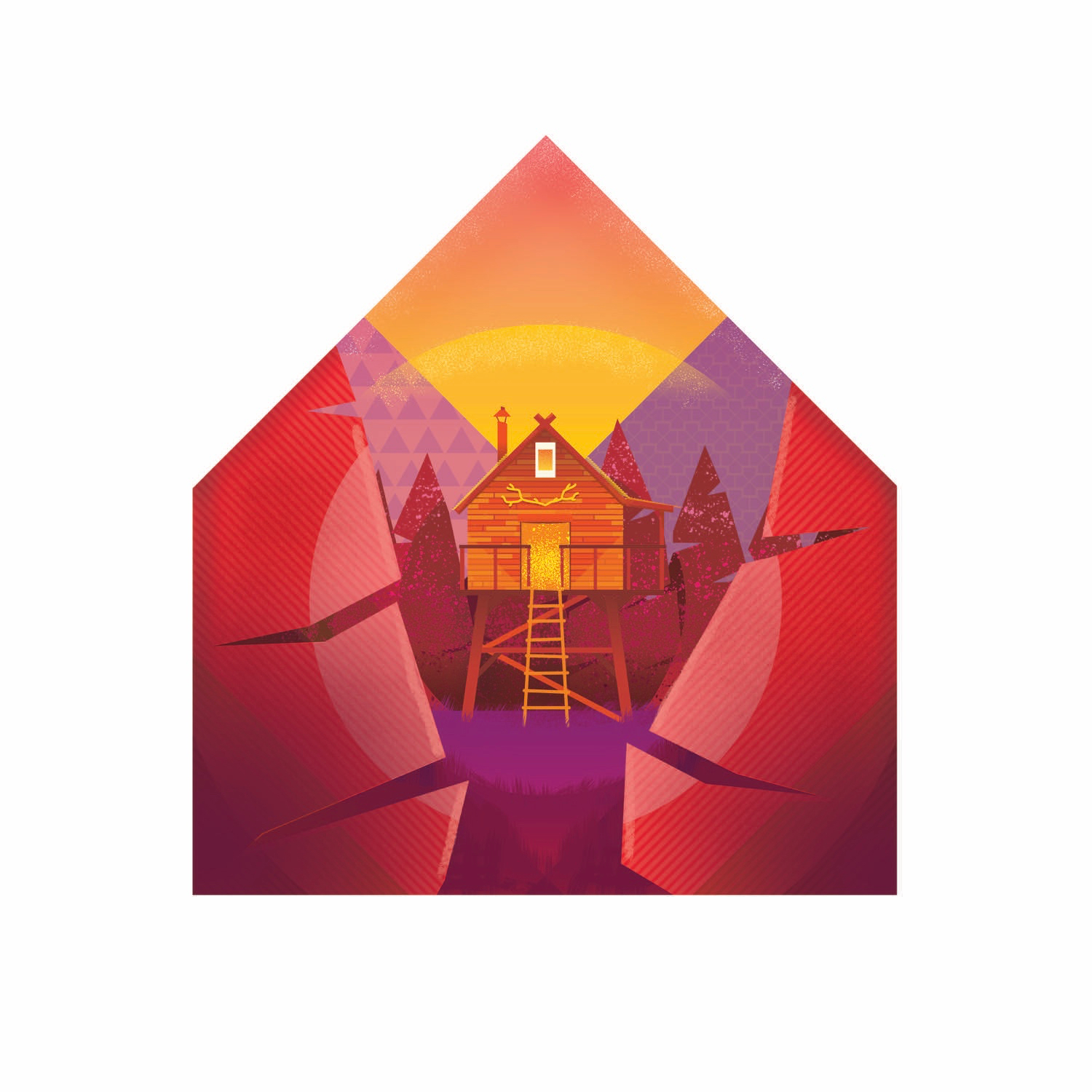Retreat and Return
If you stand in the middle of an empty Downing Street, around 30th Avenue, in Denver and look straight ahead, you will see a light-rail station jettisoned beside the street and some low level buildings that litter the periphery as a long stretch of asphalt leads the eye to the horizon. Miles away, two grayish, 1980s skyscrapers frame a view of the foothills. You can make out the patches of snow and tree lines along the ridge and grasp for them. This glimpse of the mountains through the frame of the city, surrounded by civilization and commodity, creates the desire to run from the banal into the still, quiet reserves of solitude. Civilization and solitude, city and wilderness, the balance and distinctions can often be so tenuous and vague. Where does one start and one begin?
Filter of escape
When I think of escape, it’s about an ethereal atmosphere: where the light sending shafts across your face is just right, words fall with a satisfying poignancy; it’s very poetic and meaningful. It is the sort of moment where you imagine that you could probably write a play, or a memoir. It is often meticulously calculated and captured on social media. It’s this dream I sometimes have: his face clear amongst a hazy backdrop, and there is a golden glowing that moves warmly across his lips as they move. It is late summertime. I do not know what he is saying, but I feel the meaning of the words. There is a way that our photographs make things much softer, much more beautiful, much more inhabitable than they really are.
“It is the sort of moment where you imagine that you could probably write a play, or a memoir.”
How do we value the observing and interacting within landscapes without resulting in the dreamy nostalgia of escapism? What is the danger of over-romanticizing our nature, our hideaways?
Historically, “escape” denoted fleeing towards liberty, freed from an irksome or controlling reality. It was only in the 1930s that escape began to be used etymologically as a method for retreating from reality. To “escape” became “escapism”: the tendency to seek distraction and relief from unpleasant realities, especially by seeking entertainment or engaging in fantasy, modeled by escapist literature that provided a refuge for those harried by the changes in modernism.
Similarly, in the 1800s, the noun “hideaway” denoted a person running away or a fugitive but shifted in the 1900s to primarily be used to describe a place of concealment or retreat.
Modern escapism
Research on “escapism” began in the 40s and 50s, a post-war mentality in which escape was a necessity, and researchers examined the connections between media consumption and life satisfaction. In 1996, Peter Vorderer described escapism as the desire most people have, in unsatisfying circumstances, to flee reality in a cognitive, physical, or emotional way.
Geographer-cum-philosopher Yi-Fu Tuan’s book Escapism is a dazzling exploration on cultural manifestations of this desire. In Neolithic times, our ancestors may have built shelters and plated crops to escape nature’s harshness, but now we escape the urban for the suburban lawns and parks. Tuan speaks of Disneyland, glass-towers, ivory towers, and malls—all tenuous monuments to the dream, away from the uncertainties of life, often imposed by a nature we still cannot yet control. At what point, Tuan argues, is escape inescapable? How is escapism hardwired into our human makeup? If to escape reality is to create a malleable nature, then what aspect of culture is not escape?
“If to escape reality is to create a malleable nature, then what aspect of culture is not escape?”
Away, away
“The grass is greener on the other side,” runs the clichéd motto. I often search for discounted plane tickets the night before a large deadline or after a particularly nasty fight. I could move somewhere else; I could start over. I would not need to worry about these things if I ran. A sudden urge to sprint until I’m panting, until all the air has dispelled from my chest, to use my body, overcomes me. It reminds me of an Avett Brothers refrain:
The weight of lies will bring you down And follow you to every town 'cause Nothing happens here that doesn't happen there So, when you run make sure you run To something and not away from 'cause Lies don't need an aeroplane to chase you anywhere
Plainly, People want to “get away,” and I fully understand the desire. Ecotourism has exploded. We put rails along the edges of cliffs and commercialize Yosemite, all the while promoting an Airbnb in the middle of nowhere. Advertisements show us quiet beaches, toes in the sand, and shimmering waters devoid of noise and other tourists. We would be much better people, we are sure, if it were not for the distractions. A friend once told me, “Iceland is the one place on earth that looks the least like earth.” Beautiful, stark waterfalls and geysers against a backdrop of light yellows and green, an unearthly landscape, an utterly foreign nature. A place that seems to scream clarity from its minimalist landscapes. We escape to a place least like Earth; we want to stay there and soak in this alien feeling forever. We want to easily escape to places that are difficult to reach.
The desire to escape to simple and easy landscapes stems from a “milk and honey” mentality of the Promised Land that came to fruition in the literary genre of the pastoral. We’ve all heard the lines in our high school English courses from Marvell:
“Come lay with me and be my love and we will all the pleasures prove.”
Pastoral paradise
Scholars have condemned the pastoral for its flights of fancy and its tendency to oversimplify complex societal situations for a romanticized and reductionist nature. A genre predicated upon escapism, the pastoral offered a comfortable landscape to run to when society grew too weary or complex. Centered upon the notion of “Arcadia,” there was a landscape and realm of nature that remained untouched, primitive, and pure from the ravages of civilization where utopian harmony and balance reigned supreme. The shepherd sang of a “Garden,” a lost Edenic form of existence in nature. Raymond Williams, a key pastoral critic, argued that the pastoral rests upon the notion that the industrialized city has removed us from the peaceful existence we once had in the country. For him, this is “myth functioning as memory,” remembering a false past that our ideals have created, where the present looks back toward a decline of simple life in the past. We have all heard it, thought it, felt it: “Life was so much simpler back then.”
We want to escape back to the simple, when we were carefree and life had no troubles. When all we had to do during the day was watch a river lazily float by us. My friend and I plan trips to Moab, plan trips to Zion, plan trips to Yosemite. We think of the tiny homes we could purchase, the vans we could remodel, and slowly tweak our plans to escape from the grid.
“We think of the tiny homes we could purchase, the vans we could remodel, and slowly tweak our plans to escape from the grid.”
Which world is blasé?
At its core, escapism hinges on the question of the “real.” What is reality and what is fantasy? The critics tell us to blur the lines and mix them up; virtual reality asserts that these questions are passé.
But, rather, might they be blasé? Blasé came into linguistic fashion 1913 to denote when the ability to tell the distinction between particular things is lost. A haziness of atmosphere descends and mixes it all up. I often find that my escapist fantasies are dreamy: edges are blurry and details are vague, what I am reaching for isn’t concrete but an atmosphere, a feeling, that my memory has recreated for me. I am always confusing myself with my real life and the life I live in my head, the lives I could live and the person that I could be. It is easy to escape to the mind space where I have it all together; where I am writing my next work from the porch of my secluded mountain cabin.
“It is easy to escape to the mind space where I have it all together; where I am writing my next work from the porch of my secluded mountain cabin.”
Experiencing within context
When scientists speak of one’s ability to perceive, they talk about “enframing.” As we view a site or landscape, we are compelled to frame and categorize it. Our site defines our reality—we may know that other things exist because we have seen them before, but, at every moment, we are only capable of perceiving and understanding what the widths of our eyes allow us. Yi-Fu Tuan argues that modern men and women, living amongst aspiration and pretension, suffer from Milan Kundera’s “unbearable lightness of being.” Life up so high doesn’t seem so real. We want something material, something to come into contact with.
“Life up so high doesn’t seem so real.”
For Tuan, the “real” is the impact, sensation, and felt pressure of nature: callouses on feet at the end of a long, arduous hike; sweat lining our brows; dirt under our finger nails. The real exerts a feeling of “aliveness,” where habits are shaken up. It’s to come close to the ground. The Greek origin of the word humiliation stems from hummus and in its literal terminology meant “to come close to the earth,” mirroring the story of Anteaus, a Herculean type man whose strength only persisted as long as he was touching the ground. Bring Anteaus to the heights and he was helpless.
If, as Tuan argues, human restlessness looks for relief in geographical mobility, our desire to move closer to nature is a natural one. We search to escape to a place of lucidity that comes from simplification. For Tuan, if an experience brings clarity rather than just simplification, one can arguably say that they have encountered the real. This is the difference between appreciating moments, atmospheres, and landscapes, and escaping from the pressures to a “blank page.” What one needs is not escapism, but rather a middle landscape that stays in touch with the raw reality of the natural world that remembers the connection to civilization as well. False divides have never helped us. When we retreat to nature, we are never going to blank spaces, but places with a palpable, experiential essence—ecosystems with existence long before we imposed our imagination upon theses places.
What moves escapism toward the notion of retreat and return? Action, honest encounters with nature. Escapism rarely translates into action. It is usually a state of mind we hide in. Retreat, however, requires movement and action, relying on a balance between wilderness and civilization. When we only dream of escapism or see landscapes like National Parks as the locale of our get-aways, we create an abstraction that makes it easy to exploit other landscapes.
“Retreat, however, requires movement and action, relying on a balance between wilderness and civilization.”
Return with clarification
Thoreau may have secluded himself to retreat to Walden, but he returned with an answer, a prophecy for a complex and frazzled society, teetering on the uncertain brink of industrialism. George Puttenham, one of the first pastoral theorists, did not see the form as merely recording the escape to a more rustic form of life, but as a serious guise for societal discourse. It had a didactic duty to return with clarification for modern life. It was about bringing back balance between the wild and the human.
What we need is a return to dirt, to the messy physicality of nature experiences. Not the coziness that we seek to escape to, but places of deep meaning that we return to for the quiet balance we desire. As William Cronnon argues about wilderness theory: If we imagine that our true “home” is a wilderness we can escape to, we often forgive ourselves for exploiting the land that we actually live on. Instead, a quality of “wildness” might be instilled in all the landscapes we inhabit, not just the sublime we want to run away to. Escapism, in this way, can be a dangerous nostalgia: despising the real in favor for the imagined. Escapism operates off a dissatisfaction and false dualism that can actually subtly encourage environmental exploitation: instead of seeing nature, wildness, as something that continually surrounds us, we escape to “wild” places, while leaving the urban to continue to die. We forget to gently tend our gardens, when the goal of our relationship with landscape is the task of making a fulfilling home within it.
“What we need is a return to dirt, to the messy physicality of nature experiences.”
“If we imagine that our true ‘home’ is a wilderness we can escape to, we often forgive ourselves for exploiting the land that we actually live on.”
It’s the difference between a dreamy pasture and the dirt. In the dirt, there is a beauty that has forgiven its sense of idealism. It is not about the ease, though this can be a benefit. While the reconstruction of the event can be nostalgic, often the journey in the wilderness is not: one sweats, scrapes their knees, huddles under a tree from a thunderstorm, or comes into contact with an animal much larger and more powerful. What we reclaim in a retreat and return is real action and the sense of our bodies—the sense of touch, of reconnecting with the environs that surround us. The retreat into nature can remind us to be consciously aware that we are not separate from nature but a part of and subject to it. We are wrapped up, intertwined within it—where then can we escape from ourselves?
“In the dirt, there is a beauty that has forgiven its sense of idealism.”
Wilderness therapy
There are countless organizations today that rely on this sort of wilderness therapy—bringing people out into nature as an opportunity to disconnect from the virtual and remember the real. While not all of us are ready to live in a van or fend for ourselves in the wild, retreating and returning gives us the pros of a connection with landscape without falling back onto distraction, selfishness, and a misconstruction of nature. Retreating away for solace, meditation, and a clean slate, remembering the environment and mountains that sustain us, and returning to tend for others in a harried society is the beauty of the soil.
In Norway, Arne Naess, the father of the Deep Ecology movement, pioneered the “Friluftsliv” movement—a conviction that an outdoor life can provide an antidote to the stresses of urban conditions. It’s not about an either/or but a both/and. A hideaway, a landscape, an escape that connects you to the “real” can never be escapism. It is an experience that connects you to materiality, a grounding that comes closer to the earth, an eye that recognizes beauty in the particular.
So here’s to the weekend warrior, the backcountry skier, the Chautauqua walker, and the Rocky Mountain National Park junky. Here’s to the gardener, the climber-conservationist, and the trail runner. Here’s to the people who aren’t afraid to shove their hands in the dirt, who aren’t desperate for a chance to run away but longing for a connection to the still, quiet moments of reality. Here’s to the mountains that are always beckoning us to come closer, get humiliated, and find contentment. △
Dirt
Antaeus reveled in the materiality
of his strength
which became humiliation
like its root hummus
like to come close
to the level of the ridge
and feel the terra.
To know that aspens
are rhizomes,
interconnected,
roots woven through soil,
nothing left out.
To hideaway from
the dirt is to
drift toward the sun,
risking a heavy pitch
downward, mutually assured destruction.
I am trying to get close to the reality of taxonomy,
the soil, the naming, the root.
Here is best I can say,
far from despair:
From dirt we came
and dirt we shall return.
Poem by Haley Littleton / Illustration by Ben O'Brien




